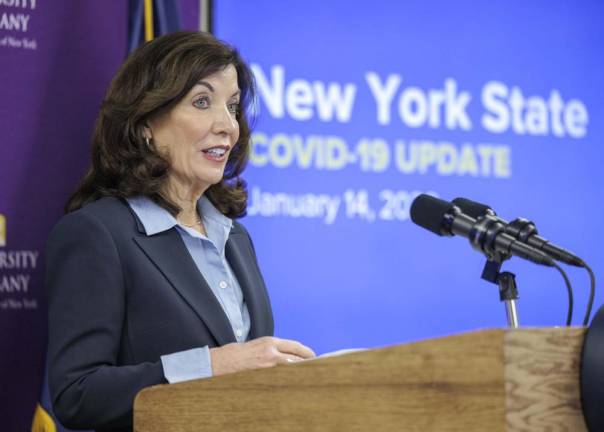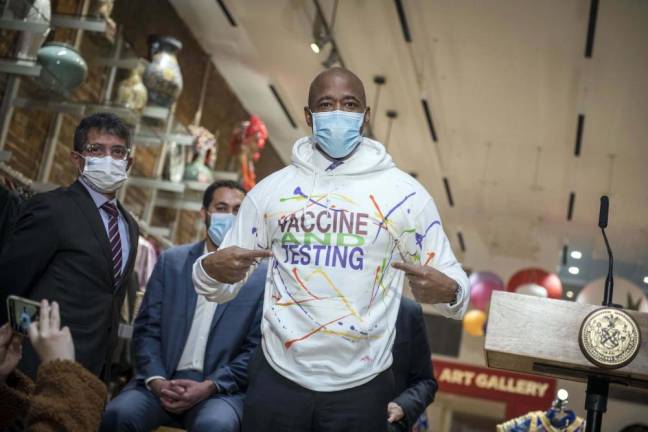The Omicron Uncertainty
Infections may be peaking, but the variant has put the city’s comeback on pause – and the mayor asks New Yorkers to take a survey about their priorities


In the face of Omicron uncertainty, the economy shuddered.
Infections from the Omicron variant may be peaking, as the governor reported Friday, but the economic and social impact of this wave ripple fiercely through life in the great city.
“I am told by the chambers of commerce that small business is in worse shape than ever,” reported Kathryn S. Wylde, president and CEO of the Partnership for New York City, the business organization. “They can’t hire workers, they cannot get hold of affordable test kits, they are turning away customers who are not vaccinated, there are no more free federal loans, and they will be evicted if they don’t pay the rent!”
Everywhere there was evidence of how the virus had taken charge and people were voting with their feet to stay out of harm’s way.
Goldman Sachs, which had ordered everyone back to work by January 18, reversed course and postponed the mandatory return until February 1.
Mayor Eric Adams, who had been adamant that kids needed to come to school, shifted ground and began talking to the teachers’ union about remote learning for the hundreds of thousands of students who have not shown up to school.
Subway ridership, which had been climbing steadily last fall, plunged.
“This is the fourth time around and every reversal in the process of reopening has increased the overall level of uncertainty,” Wylde said.
There was no answer to when the coast would once again be clear, so everyone made their own decision. “To Kill a Mockingbird,” one of Broadway’s more successful dramas, announced it was suspending performances until June, when it would reopen in a smaller theater.
Two other shows, “Girl from the North Country” and “Mrs. Doubtfire,” also announced suspensions, prompting criticism from the musicians union that the producers were using the COVID crisis to cut costs through the winter, which is traditionally slower.
“I had to turn the show off,” said the producer of “Mrs. Doubtfire,” Kevin McCollum. “Preserve my capital, and use it when the environment is more friendly towards a family show.”
Two business colleagues, who hadn’t seen each other in person since before the pandemic, decided they needed a brainstorming session. “We have a project we really have to think through,” one of them said. “It’s not a Zoom call. But no one will get together now.” They scheduled for March.
“Curveballs You Can’t Predict”
Embracing the uncertainty has become a core mantra for Professor Denis Nash of the CUNY School of Public Health, whose firm, Epidemic Intelligence, advises companies and institutions on managing the pandemic safely.
“It is one of the more frustrating things we hear from our clients,” Nash said. “They want to move forward, but they also know that there have been curveballs that you can’t predict. And they don’t like to make a plan or policy only to have it go out the window. But incorporating some of the uncertainty into the planning and communications can help with morale of leadership and employees.”
Governor Kathy Hochul seemed to be struggling with just that challenge Friday. She was almost giddy in declaring that New York had turned the corner on Omicron.
“Turning the corner, you heard it here first. I’ve been waiting to say it: turning a corner,” Hochul said. “Our highest point was a week ago. Highest to lowest in a week thus far and that lowest is going to continue to go down.”
But then she quickly added that it was not yet time to “spike the football,” and New Yorkers needed to continue to be cautious. She said she had not yet decided whether the state would extend the current mask or vaccine mandate, which expire February 1.
“I don’t have the knowledge right now of what’s going to happen on February 1,” she said. “We’re going to monitor the situation and make sure there’s not a trend that changes things quickly.”
Nash recommends that both government and business leaders adopt this humility of acknowledging what they don’t know.
“It’s important to ask what we as citizens should be doing,” he added. “We are not always going to get good or clear advice and guidance from government.”
Immediate Challenge
The heavy emphasis by government leaders on vaccination, for example, while vital in the long run to end the pandemic, has little impact on the immediate challenge of curbing the very high transmission of Omicron, Nash noted.
“We need to focus on whether the surges in transmission are overwhelming the hospital system,” he explained. “If the peak of the surge is very high and sustained for a long period of time we could still overwhelm the health care system.
“We are coming very close to that in New York. We are certainly overwhelming the health care workers themselves.”
A key focus, Nash recommended, is “more masking with better masks,” even if this is unpopular. “New York is pretty good but we can always do better. The way we can do better in New York is higher quality masks.”
The city was doing well on testing until the Omicron surge. “We’ve really faltered,” he said.
“We did not have the capacity to cover people with enough testing. We should have prioritized testing for those key sectors that really needed to operate with little disruption. health care. Education. transportation. These people should not have to be waiting for a test, wondering if they have COVID. Instead there was a free-for-all. Get a test if you can, good luck.”
One major concern now in the business community is that Omicron is not only delaying recovery but deepening permanent changes to the economy. Wylde noted that there has been a sharp increase in the proportion of job postings that allow employees to work remotely, from 4 percent before the pandemic to 10 percent now.
“The longer people work remotely, the harder it is to get them back,” Wylde said.
“In terms of drawing a line, I don’t think policy makers have the ability to draw that line. It is going to happen organically and depend on global trends in how people make their own decisions about health v. economic/social interests.”
Citywide Survey
In the face of the Omicron uncertainty, Adams turned to the public with a survey asking New Yorkers for their priorities, including on how to deal with the pandemic.
“The economic impacts of COVID-19 have been particularly difficult for the city’s ~230K small businesses, a third of which are at risk of closing permanently,” was one question. “What should City government do to help small businesses succeed economically?”
The survey also asked New Yorkers which of these actions they support to limit the spread of COVID-19:
*Create flexibility around hybrid work environments to enable workers to be remote;
*Mandate proof of vaccination to enter or work in private offices;
*Mandate vaccination to enter event venues and congregate settings;
*Require masks in all indoor locations;
*Close in-person school and shifting to virtual learning when COVID rates are very high;
*Enforce a two-week lockdown banning indoor social activity when COVID rates are very high;
*Mandate vaccination to work in public buildings, including schools.
The survey can be taken online at https://nycspeaks.org until January 28 and results will be reported in February.
Adams is far from alone in leaning on his constituents for guidance, Wylde said.
“That is a good indication of what is happening at companies and in society generally.”
“The longer people work remotely, the harder it is to get them back.” Kathryn S. Wylde, president and CEO of the Partnership for New York City